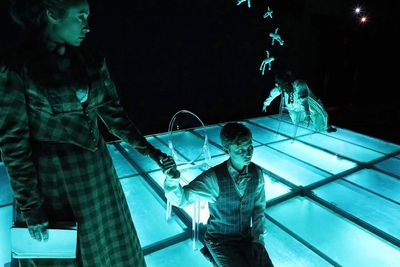There's something almost peculiarly and particularly English about a story involving a governess, a country house that may actually be permanently swathed in mist, children whose parents are dead by one circumstance or another, and in which the secrets of the house / housekeeper / master of the house provide the crux upon which the entire work revolves. Seriously... Charlotte Brontë's Jane Eyre, Frances Hodgson Burnett's The Secret Garden, and Henry James' The Turn of the Screw. One doesn't imagine a governess, pale children, and brooding farmhouse in Iowa, for example.
Not surprisingly, all three of the aforementioned works have been set to music. Paul Gordon and John Caird's Jane Eyre played on Broadway in 2001. Marsha Norman and Lucy Simon's The Secret Garden came before it 1991. But the progenitor of this lot came in 1954 with English composer Benjamin Britten's The Turn of the Screw, co-created with Myfanwy Piper for that year's Venice Bienniale. And it is the Nasvhille Opera's winter production of The Turn of the Screwthat brings us to the haunted moors of the Noah Liff Opera Center on this chilled Tennessee weekend.
Britten's intimate chamber opera is exemplary of its period and, at times, adheres to composer Arnold Schoenberg's 12-tone compositional structure. Instead of the smooth, melodic instrumentation of previous generations, this 12-tone ideology uses all notes - imagine, if you will, the white and black keys of a piano - without regard to a traditional musical key determining sharps and flats. This atonal approach can be jarring, but who wants smooth and sumptuous when evil lurks just out of view?
Artistic Director John Hoomes wisely does away with rooms full of moody Victorian furniture, casting their long shadows. Instead, the in-house trifecta of Hoomes, Randy Williams (Director of Production), and Barry Steele (Lighting Designer) have createda minimalist lucite chess board upon which the opera unfolds. And a wise decision it proves to be. Let the terror come not from shadows and what we fear hides in them. Britten creates flesh phantoms in the persons of a former valet and prior governess to create terror enough at Bly House.
Michael Anderson, seen recently in Nashville Opera's double Christmas bill of Pepito and Amahl and the Night Visitors, is one of those things that go bump in the night: Peter Quint, former valet to the master of the house. There are many jokes out there about gingers not having souls. There's no joking, though, about Mr. Quint and the sins in his past. His accomplice in the dastardly doings is Micaëla Aldridge's Miss Jessel, the children's former governess. The circumstances surrounding the deaths of both Quint and Jessel are a.) recent and b.) deeply suspicious. Neither, it seems, are cold in the ground yet, nor, perhaps, cold at all.
Roped into this swirling gyre of pastoral English Hell is Lara Secord-Haid as the new governess to young wards Miles and Flora. Secord-Haid's light, flowing soprano suggests a youth that sets her only a few years above the children in her care. Her mannered porcelain face keeps her terror under wraps until it's all but surrounding her and overwhelming her spirit. More than her anything, the slow release of her auburn hair allows her inner unraveling to show through on the outside.
As her charges, Helen Zhibing Huang's Flora and Caleb Killingsworth's Miles are superb. It's a difficult dance to be an adult talent and yet maintain a child-like innocence. Both are honest-to-god adults, but you'd be fooled to think so in costume and in the superb lighting effects. It's Killingsworth's Miles who, in the tradition of English boy sopranos, is given the richer material in the supernatural tug between earthly and ethereal. And I'll be damned if I'd have ever thought him to be a college student at Belmont. His superb countertenor voice (read: high notes) sails through the space.
Rounding out the cast is Kaylee Nichols as Mrs. Grose, the housekeeper at Bly. More than that, though, she is the keeper of secrets with full knowledge of what has happened in the house's past. It is Grose who is able to end the horrors that persist in the house and Nichols plays her with a guarded intensity. She is afraid of what she knows, of what she has seen. Nichols' mezzo-soprano voice manages to pierce through in the larger group moments with contrapuntal musical lines coming from every direction. It's wonderful to see her versatility, having last played the Mother in Amahl at Christmas.
The chance to see a Benjamin Britten opera is all too rare. His works, though brilliant, can be difficult and have not yet entered the wider popular repertoire in the ways Puccini and Strauss have. It's been since 2013 that the Met last mounted one of his works. Nashville Opera's model of two large mainstage productions at TPAC and two in-house engagements at the Noah Liff Opera Center is laudable. It allows the popular, well-known works to be brought to a large audience and gives a chance for intimate, lesser-known operas to be performed in novel ways for the die-hards. Nashville Opera's production gives you all of the ooky-spooky with none of the kitsch. With a talented cast and the excellent orchestra led by Dean Williamson, this is one walk through a haunted house you don't want to miss.
The Nashville Opera production of Benjamin Britten's The Turn of the Screw opens tonight at 8 p.m. at the Noah Liff Opera Center and continues Saturday night at 8 and Sunday afternoon at 4 p.m. Limited tickets remain and more information can be found at the Opera's website.
Read more by Out & About's Will here.
